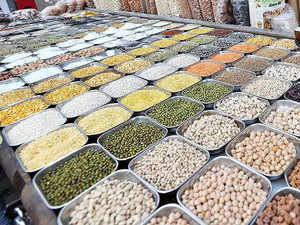 |
| Kothari said if there was a shortfall in production of tur crop and rabi pulses, then India may allow import of pulses. |
Also, the trade says the notification issued by the Directorate General of Foreign Trade (DGFT) imposing the restrictions should be done away with. Recently, the Rajasthan and Madras high courts stayed the notification till final hearing, thereby allowing traders to import pulses. However, the government may not accept the demand.
“Pulses are ruling below the minimum support price (MSP). Also, there is a huge buffer stock of 11lakh tonnes with government agencies. Extending the import restrictions may ensure farmers get good prices,” said a government official.
According to the agriculture ministry, the output of kharif pulses such as tur, moong and urad is estimated at 9.22 million tonnes, less than last year’s production of 9.34 million tonnes. “We expect tur production to be down by 40-50% of last year and urad to be down by 25%. Also, the rabi planting is progressing slowly. Hence, we will have to wait till December to get clarity on production and demand before making a final call on the import policy,” said Bimal Kothari, vice-chairman of the India Pulses & Grains Association.
Kothari said if there was a shortfall in production of tur crop and rabi pulses, then India may allow import of pulses. In Indore, arhar prices were ruling 20% below the MSP at Rs 4,500 for 100 kgs, while urad was 21% lower at Rs 4,400, said Suresh Aggarwal, president of the All India Dal Mills’ Association based out of Indore. “Loopholes in our judiciary is allowing traders to import pulses through Chennai and Kolkata ports. Either we should open imports of pulses or strictly impose the DGFT notification,” he said.










No comments:
Post a Comment